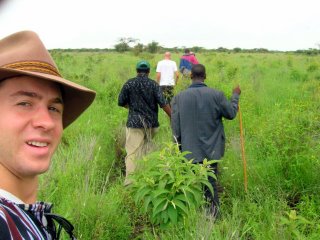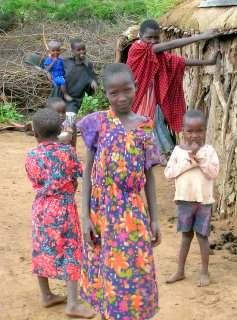A chorus of songbirds creates a symphonic background to lush pastures and thriving acacia trees. Few would suspect a recent drought has killed many cattle, leaving the grass uneaten to rot in the Maasai land of Puko, a community in Central Kajiado District southeast of Nairobi near the Tanzanian border.

Norkeyio Nkurruna does not recall a drought this severe since she was a little girl. During this drought she lost eight cows, most of whom were expectant. The three remaining young ones will hardly be enough to support her six children and numerous grandchildren living within her compound. Her husband Olesalao has a total of twenty children with two other wives, and his herd of 306 is now down to a mere 50. He now leaves the pickup truck at the house, unable to afford the fuel for the 13 km trek to town.

Heading to the Borehole Site
The whole region has suffered from the drought, with no health network for over 70 bomas or family compounds. The nearest water source is 11 km away, a borehole that was only put in last year and ceased to work for many months. This means a full day must be sent to take the cattle for water, and the women make the three-hour journey one way.
 Boreholes are notorious for not working consistently in this region. Prolonged drought exacerbates the situation, often overworking the generator until it breaks. During the drought, each herdsman must pay 25 Kshs ($ 0.32) per head of cattle to drink from the borehole. The community has already shown great initiative, putting together their resources and paying to survey a borehole site. The community has also given small goats to desperate families in order to breed and replenish their livestock.
Boreholes are notorious for not working consistently in this region. Prolonged drought exacerbates the situation, often overworking the generator until it breaks. During the drought, each herdsman must pay 25 Kshs ($ 0.32) per head of cattle to drink from the borehole. The community has already shown great initiative, putting together their resources and paying to survey a borehole site. The community has also given small goats to desperate families in order to breed and replenish their livestock. Another decade will pass before the Nkurruna family has another 100 cows, still only half of what they had. Yet a son Mokinyo Dami fears they will never make have that many, with food and school fees for the children to pay. After the drought’s devastation, he and his wife Enoolera have decided to invest in the education of their children rather than food for their cattle.
Another decade will pass before the Nkurruna family has another 100 cows, still only half of what they had. Yet a son Mokinyo Dami fears they will never make have that many, with food and school fees for the children to pay. After the drought’s devastation, he and his wife Enoolera have decided to invest in the education of their children rather than food for their cattle.

No comments:
Post a Comment